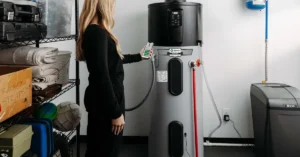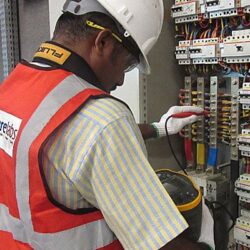High capacity electric water heaters are essential for facilities that require a large and consistent hot water supply. These systems are widely used in industrial, commercial, and residential buildings where standard water heaters cannot meet demand. Designed to handle high volumes of water efficiently, they combine energy-saving technologies with durable components. Understanding how these systems work, their types, and where they are applied helps in choosing the right solution for any hot water requirement.
Understanding High Capacity Electric Water Heaters
The high capacity electric water heaters designed to heat and store larger quantities of water compared to conventional units. They rely on electricity as their main energy source and operate through heating elements located inside the tank.
What Defines High Capacity
A high capacity electric water heater typically holds more than 100 liters of water, extending up to several thousand liters for industrial models. The size and capacity depend on the number of users, usage frequency, and temperature requirements.
How They Work
These heaters function by passing an electric current through heating elements submerged in water. The heat generated raises the water temperature, which is then stored in a well-insulated tank. Advanced thermostats regulate temperature and ensure consistent performance while preventing overheating.
Importance of High Capacity Electric Water Heaters
Large-scale facilities depend on uninterrupted hot water availability for operations, cleaning, and comfort. High capacity electric water heaters are preferred for their ability to meet heavy-duty requirements without efficiency loss.
Meeting Commercial Demands
Hotels, hospitals, and manufacturing plants often experience simultaneous hot water usage. High capacity units ensure stable temperature and sufficient supply even during peak hours.
Supporting Energy Efficiency
Modern electric water heaters are engineered with improved insulation and control systems that minimize energy waste. This helps businesses manage utility costs while maintaining operational efficiency.
Reliability and Safety
Electric systems are known for their safety and ease of installation compared to gas-based alternatives. Built-in safety valves, thermostats, and pressure relief systems protect users and equipment from potential damage.
Types of High Capacity Electric Water Heaters
There are various configurations of high capacity electric water heaters designed for different settings and requirements.
Storage-Type Electric Water Heaters
These models store a large amount of heated water in insulated tanks. They are ideal for buildings that need an immediate and steady water supply. Storage units can range from small domestic versions to industrial-scale systems.
Instant or Tankless Electric Water Heaters
While most tankless models are smaller, some advanced versions are designed for high capacity use. They heat water on demand, which saves energy and eliminates standby losses.
Centralized Hot Water Systems
For large facilities such as hotels and hospitals, centralized systems distribute hot water through a network of pipes connected to a main storage unit. This setup ensures even temperature distribution across multiple outlets.
Key Features of High Capacity Electric Water Heaters
High capacity systems incorporate advanced technology to enhance efficiency, reliability, and performance.
High-Efficiency Heating Elements
Modern units use durable heating elements made from stainless steel or copper, ensuring rapid heat transfer and long service life.
Thermal Insulation
The tanks are insulated with polyurethane or fiberglass to reduce heat loss. Good insulation improves energy savings and maintains consistent water temperature.
Temperature Control Systems
Digital thermostats and control panels allow precise temperature adjustment. Some systems even include smart monitoring options for better management.
Corrosion-Resistant Construction
High-quality materials protect the tank and components from corrosion, extending the system’s durability even under high pressure and temperature.
Applications of High Capacity Electric Water Heaters
These water heaters serve a wide range of applications in both commercial and industrial sectors.
Hotels and Resorts
Guest accommodations require continuous hot water for bathrooms, kitchens, and laundry facilities. High capacity systems ensure that demand is met efficiently.
Hospitals and Healthcare Facilities
In healthcare environments, reliable hot water is vital for sanitation and patient care. Electric systems maintain hygiene standards through controlled heating.
Industrial Plants
Manufacturing processes, cleaning systems, and worker facilities in industrial plants depend on large volumes of hot water. High capacity water heaters provide the required output with precision.
Residential Complexes
In multi-story apartments or villas, centralized electric water heating systems provide convenience and reduce the need for individual units in each apartment.
Benefits of Using High Capacity Electric Water Heaters
The advantages of using high capacity electric water heaters go beyond just meeting water demands.
Consistent Hot Water Supply
These units deliver continuous hot water, even in facilities where usage is constant throughout the day.
Energy and Cost Efficiency
Newer models feature smart control systems and better insulation, which minimize energy consumption and operational costs.
Easy Installation and Maintenance
Electric water heaters are easier to install since they don’t require gas lines or ventilation systems. Routine maintenance involves periodic inspection of heating elements and safety valves.
Environmental Benefits
Electric water heaters can operate using renewable energy sources such as solar or wind power. This makes them a sustainable choice for eco-conscious facilities.
Factors to Consider Before Selecting a High Capacity Electric Water Heater
Choosing the right water heater requires evaluating technical and operational factors.
Capacity Requirements
Determine the volume of hot water needed per day. For commercial setups, this depends on the number of users and equipment requiring hot water.
Power Availability
Check the electrical infrastructure to ensure it can support the required load. High capacity models often require three-phase power connections.
Space and Installation Location
The available space will influence the type and configuration of the heater. Vertical and horizontal tanks are available to suit different installation layouts.
Safety and Compliance
Ensure the system meets local safety regulations and international standards for water heating equipment. Pressure relief valves and thermostats are essential components.
Trends in High Capacity Electric Water Heater Manufacturing
The water heating industry is evolving with technological advancements aimed at improving performance and sustainability.
Smart Control Technology
Modern electric water heaters include IoT-based systems that allow remote monitoring and temperature control. This helps optimize energy consumption and detect faults early.
Integration with Renewable Energy
Manufacturers are producing hybrid systems that can connect with solar panels or heat pumps. This integration reduces electricity costs and carbon emissions.
Use of Advanced Materials
To enhance durability and efficiency, manufacturers use corrosion-resistant alloys, high-grade insulation, and precision electronic controls.
Conclusion
High capacity electric water heaters are indispensable for large-scale water heating needs in residential, commercial, and industrial applications. Their ability to provide consistent hot water with minimal energy loss makes them a reliable and efficient solution. As technology continues to advance, these systems are becoming smarter, more energy-efficient, and easier to manage. Selecting the right capacity and configuration ensures long-term performance, safety, and cost-effectiveness.





